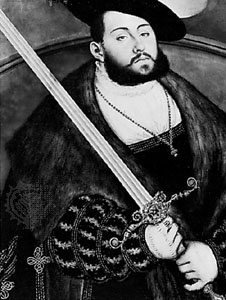John Frederick
elector of Saxony
byname John Frederick the Magnanimous, German Johann Friedrich der Grossmütige
born June 30, 1503, Torgau, Saxony
died March 3, 1554, Weimar, Saxe-Weimar
 last elector of the Ernestine branch of the Saxon House of Wettin and leader of the Protestant Schmalkaldic League. His wars against the Holy Roman emperor Charles V and his fellow princes caused him to lose both the electoral rank and much of his territory.
last elector of the Ernestine branch of the Saxon House of Wettin and leader of the Protestant Schmalkaldic League. His wars against the Holy Roman emperor Charles V and his fellow princes caused him to lose both the electoral rank and much of his territory.The elder son of the elector John the Steadfast, John Frederick succeeded to the Ernestine lands in 1532. As head of the Schmalkaldic League (q.v.) for the defense of the reformers, he hesitated to oppose the Holy Roman emperor Charles V, in whose pacific intentions he believed. His Naumburg coup, when he forced the replacement of an elected Catholic bishop by a Protestant one, however, helped convince Charles V to take up arms against the Reformation. Furthermore, by seizing the town of Wurzen, John Frederick ignored the rights of his second cousin Maurice, Saxon duke of the rival Albertine branch of the House of Wettin.
The ensuing enmity helped split Germany's Protestant princes. When the Emperor defeated the Schmalkaldic League at the Battle of Mühlberg (1547) with the aid of Maurice, the electoral dignity was granted to the Albertines. John Frederick, wounded and taken prisoner, was condemned to death but saved himself by acquiescing to electoral and territorial losses. He refused to compromise on religious issues, however, and enjoined his sons to refuse peace with Maurice. In 1552, during a war between the Emperor and Maurice, John Frederick was freed. After the death of Maurice (1553), he hoped to regain the electorship but was disappointed when Maurice's successor Augustus was granted the title. Considered a martyr of Protestantism, John Frederick continued to enjoy the respect of his people and fellow princes until his death.
- Nova Scotia, flag of
- Novatian
- Novato
- Novaya Zemlya
- Novaës, Guiomar
- Novecento movement
- novel
- novella
- Novello, Antonia
- Novello, Ivor
- Novello, Vincent
- novel of manners
- novelty song
- November
- Novembergruppe
- November Insurrection
- Noverre, Jean-Georges
- Nove ware
- Novgorod
- Novgorod school
- Novgorod, Treaty of
- Novhorod-Siverskyy
- Novial
- Novikov, Nikolay Ivanovich
- Novikov, Sergey Petrovich